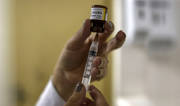
Yellow fever: A vaccine-preventable viral infection
Posted 23 Feb 2024 | Source: https://www.happiesthealth.com/articles/infectious-diseases/yellow-fever
Yellow fever is a viral fever usually seen in the tropical regions of Africa and South America. According to WHO, as of 2023, 34 countries in Africa and 13 countries in Central and South America are either endemic to, or have regions that are endemic to yellow fever. It is recommended that people traveling to or from these countries should be vaccinated against yellow fever.
According to the Centers for Disease Control and Prevention , India has no risk of yellow fever. Moreover, the Indian government mandates that those traveling to or from those endemic countries are required to possess a valid yellow fever vaccination certificate, issued by authorized and designated vaccination centers in India.
How is yellow fever transmitted?
“Yellow fever virus belongs to the Flaviviridae family of viruses, which mainly infect mammals and birds. The virus is primarily transmitted to humans through the bite of infected Aedes mosquitoes, particularly Aedes aegypti in urban settings and Aedes albopictus in forested areas,” says Dr Swati Rajagopal, consultant, infectious disease and travel medicine, Aster CMI Hospital. The virus, which originated in the African rainforests around 3000 years ago, spread to the Americas in the 1600s with the transatlantic slave trade. Besides infected people, the trade ships carried water barrels, which served as a breeding ground for mosquitoes.
The yellow fever virus is transmitted when Aedes mosquitoes bite an infected primate — human or non-human, and then bite a healthy primate. The disease is a viral hemorrhagic fever (VHF), which can affect multiple organ systems in severe cases and also result in hemorrhaging (bleeding). These mosquitoes usually bite during the day and breed around houses, forests or both.
Symptoms
People develop symptoms of yellow fever within three to six days of being bitten by an infected mosquito. These symptoms can vary in severity. According to Dr Chhavi Gupta, senior consultant, infectious diseases, Yashoda Super Speciality Hospitals, Delhi NCR, they include:
- Sudden onset of fever
- Chills
- Severe headache
- Back pain
- Body aches
- Nausea and vomiting
- Fatigue and weakness
Dr Gupta says that while most people improve after these initial symptoms, roughly 15% of people will develop a more severe form of the infection. “In such cases, one may develop high fever, jaundice, bleeding, especially from the gastrointestinal tract, and organ failure,” she shares. Moreover, the “yellow” in the name of this infection refers to the yellowing of skin and eyes when someone with a severe form of the infection develops jaundice. Further, she shares that the severe illness could prove fatal for 20-50% of people.
Diagnosing the condition
“Laboratory tests and blood tests to detect the presence of the virus or antibodies produced by the immune system are used to diagnose yellow fever,” says Dr Swati. She adds that it can be difficult to make a diagnosis as the condition can be mistaken for other infections commonly seen in tropical regions, like leptospirosis, louse-borne relapsing fever and other viral hemorrhagic fevers such as dengue fever and malaria.
Dr Swati says that specific diagnostic tests and travel history to endemic areas help distinguish it from other conditions. “It is important to consider this illness in a febrile traveler (a traveler having a fever),” she emphasizes
Yellow fever treatment
Treatment of yellow fever mainly involves supportive care aimed at managing the symptoms, as there is no specific antiviral medication for the infection.
“Supportive treatments including ample rest, intravenous fluids, pain relievers and fever-reducing medications may relieve symptoms of fever and body aches,” says Dr Gupta.
In severe cases, hospitalization may be required to monitor and treat complications.
Preventing yellow fever
Experts share that a single dose of yellow fever vaccine confers life-long protection against the virus. Measures to avoid mosquito bites, such as using insect repellants and wearing protective clothing can also help reduce the risk of infection.
Takeaways
- Yellow fever is a viral hemorrhagic fever transmitted by infected Aedes mosquitoes.
- The symptoms of the infection can range from mild to severe. They can also be confused with conditions like leptospirosis, malaria, and dengue.
- The yellow fever vaccine offers life-long protection against the virus.
